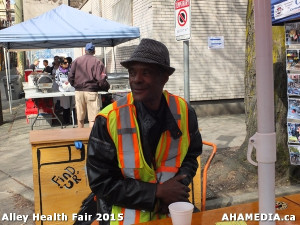
Rest in Power Brother Richard!

Richard David Cunningham 7 February 1961 – 23 December 2015
Richard was a member of Vancouver Area Network of Drug Users (VANDU) “from the start” as he always said. He was an activist and leader in the community and a member of the VANDU’s Board of Directors for the past several years. I want to honour Richard by remembering some of his work for social justice over the last decade.
Back in late 2008 the Vancouver Police Department decided that it was time to “clean up” the Downtown Eastside in advance of the coming winter Olympics. They attempted to do this by handing out more than 1,400 bylaw tickets to very poor people in the community for “public nuisance” offenses like jaywalking, selling salvaged goods on the sidewalks, and peeing and pooping in the alleyways.
Richard was part of a group that recognized the injustice of this targeting. With his big voice, his flair for the dramatic and his powerful presence, he was on the frontlines to protest and demand that the tickets be scrapped. And after almost a year of hard work we won a significant victory: two thirds of the tickets were scrapped.
After that campaign Richard really began to shine as a leader and he made a huge contribution to the community. Pedestrian safety, access to toilets, and a safe and organized approach to survival activities like street vending are important concerns in our neighbourhood. Richard was at the forefront of the struggle to improve these conditions and make the neighbourhood better for everyone.
Richard was a drug user and a poor man, but his legacy is rich. He leaves a material legacy of pedestrian safety in the DTES and life for those not getting hit by speeding cars; of dignity for the person who doesn’t have to take a poop in the alley because they are homeless; of legitimacy for the vendor who is trying to survive in very hard economic times and now knows, at least, that it’s an injustice to be criminalized for it and that things can be done differently.
But most important is the intangible legacy that he leaves. A legacy of solidarity between the poor and oppressed people in a neighbourhood, a legacy of hope for a brighter future, and a legacy of courage for those who will have to struggle to create that future.
